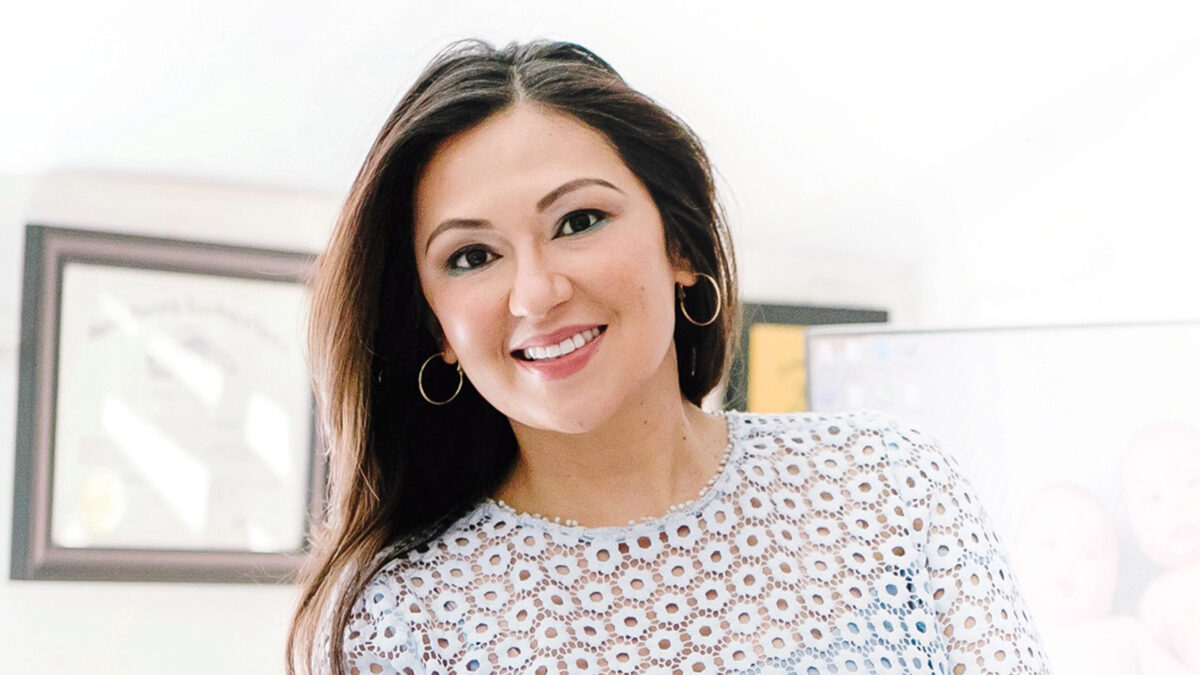
Meet CBA President Catherine Chan
June 2024
Download This Article (.pdf)
Catherine Chan, who recently took over the helm of the CBA as its 2024–25 president, always knew she wanted to go into a “helping field” as an attorney. From her parents, she learned to take care of others and to try to be a steward in society. A career as a lawyer seemed the ideal avenue for this, and also appealed to her love of writing and logic.
In law school, Chan assumed she would find her calling as a labor and employment lawyer working for an American union, but a bleak job market in that field and the happy accident of her decision to audit a course on immigration law after graduation changed her path. “I found the subject so intellectually challenging, and that hasn’t changed even after 20 of practice,” she says. “This field requires practice in state courts, federal courts, administrative courts, appellate practice, and more. Working knowledge of so many areas of the law are also needed, including family law, criminal law (state and federal), and administrative law.”
Path to Solo Practice
Chan, an immigrant herself, arrived in the United States with her family from Tehran, Iran, when she was just 10 years old. She grew up and attended college in Michigan but chose Colorado for law school. “Colorado’s topography, climate, and natural environment reminds me of Iran. I stayed for the mountains,” she says.
After passing the Colorado bar exam in 2003, Chan then finished a master’s degree in global trade and finance in 2004. It was during that time she audited that career-altering immigration law course. “When I found immigration law, my mind was blown away. I fell in love with the subject. From there, the idea for my solo practice was born,” she says.
“With the blessing of my parents, together with my then-partner, who had also recently been sworn in as an attorney, the decision was made.” Starting her solo practice as a new lawyer, Chan relied on her father’s advice, some of the best she’s ever received: “‘Remember, no one starts out on top.’ Those words help guide my patience in my practice and in my work.”
The learning curve, she admits, was steep. “Very steep! Still is! I had the fortune of cutting my teeth on the first case that I accepted as a solo practitioner in just about every court level possible.” Chan tells the story of a tearful young lady who came to her office because, according to her, no one would take her case. She had lived in the United States since she was 2 years old, yet legal complications made it so that she was deportable and ineligible for any defenses. “I begged a criminal defense lawyer I had just met, who remains a close friend and mentor in my life, to help me,” she says. Together they managed to get the client’s legal troubles cleared enough to allow her access to a defense to deportation. “I ultimately took her through naturalization. She will never fear being deported to another country again. She remains a friend to this day.”
Field of Dreams
This is part of what Chan calls the “shining glory” of this work: “My work gifts me with close relationships with people from all over the world, from all walks of life. I get to be a part of an important journey in people’s lives. I get to be a student, and a teacher, simultaneously. I live a lawyer’s dream life of a mix of litigation and appeals and state and federal work. But the most rewarding part is the chance to make an impact on the lives of individuals and their families. I am humbled continuously by the strength and courage of people who leave everything behind in their home countries to chart a new path for their future and their families. It’s my wish that the United States remains a beacon of hope around the world and extends the promise of hope globally for many generations.”
Collaboration is an integral part of immigration, which can and often does span many legal fields (family, criminal, trusts and estates, civil litigation, construction, business, tax, employment, and more), but it also involves just as many other professionals, including those working in mental health, law enforcement, state services, and social services. “Attorneys cannot advise above their pay grade, so collaboration with other professionals is key. I’ve consistently encountered an impressive level of attorney and professional aptitude and compassion throughout the state. This should be applauded and recognized for the high bar it sets and accomplishes.”
With the sheer volume of resources needed to advance successful cases, Chan acknowledges that this can often carry additional cost burdens for clients. Nonprofits help alleviate some of these burdens. For example, Chan has worked with the Colorado Mental Health Institute of Pueblo for over a decade, helping their patients in securing or maintaining their lawful status in the United States. “Ultimately, each case will have its own network needs, and those networks help bring together the ultimate fruition for the client.”
CBA Leadership
Chan first became involved with the CBA early in her career, as a volunteer with the Access to Justice Committee. By 2010, she was an officer in the Board of Governors, and by 2011 she was serving on the Denver Board of Trustees. She’s served on the Joint Management Committee of the CBA/DBA/CBA-CLE for five terms, acting three times as its chair. In 2020 she was selected to serve on the CBA-CLE Board. She is also a CBA-CLE author and presenter.
In pursuing the CBA presidency, Chan consulted two of her most important collaborators, her 12-year-old identical twin sons, Kiyan and Kameron. “They are the light of my life. I sought their permission, and they consented, before I applied to join the CBA leadership team. Today, they are proud that I am the CBA president. I am also grateful to my work family, my parents, my sister and her husband, and friends and colleagues that include many bar leaders for their constant support and mentorship.”
As Chan begins her term as CBA president, the compassion, collaborative spirit, and generosity she brings to the role are evident. “I chose to apply for the CBA presidency because I want to invite more attorneys to the CBA to embrace the values of professionalism and community service within their careers. I want to focus on attorney mental health as a critical component of an attorney’s toolbox to survive and thrive in their practice. I want other diverse female attorneys to visualize their own paths to leadership after witnessing diminishing glass ceilings. I want to bring a voice to small firms, solo practitioners, federal practitioners, women-owned law firms, and each and every ‘bleeding heart’ area of the law, including those aimed at protecting the rights of victims and survivors, veterans, and the elderly.”
Chan notes that “membership cannot be taken for granted. The CBA must always be in an innovative mode to meet the profession’s needs as they arise.” In addition, “the CBA thrives with its partnerships with the DBA, CBA-CLE, local and diverse bars, the judiciary, the Colorado state legislature, and local communities. The CBA must continue to build local and national partnerships to advance the profession and the organization. The CBA is poised today to glean from the past and move boldly into the future, having learned critical lessons over the last few years. It’s an honor to be in a position of trust to lead the CBA forward.”


